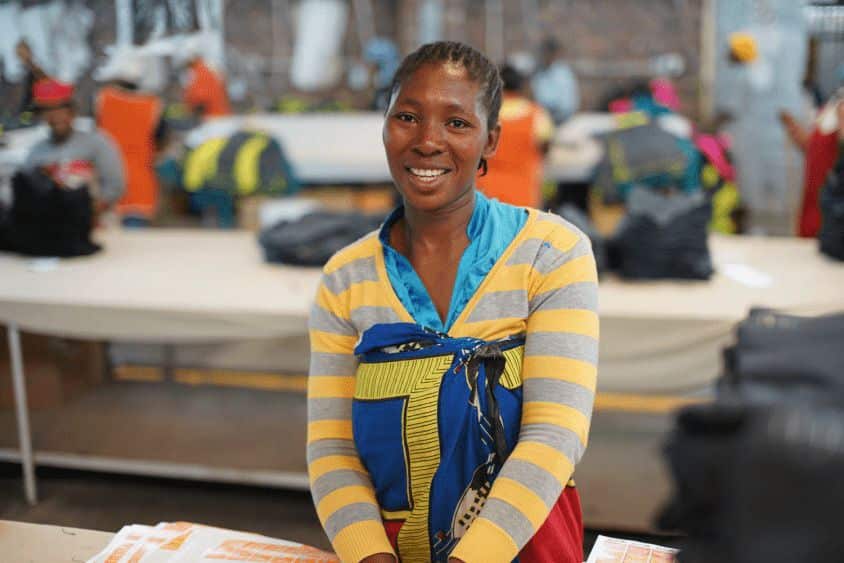With the majority of garment workers being young women, maternity rights at work are of great importance. In Lesotho, Better Work is striving to ensure that the needs and rights of pregnant workers are being met.
6 August 2014

Maseru, Lesotho — When 31-year-old Mamontseng Habahaba was pregnant with her third child, the quality control inspector at one of Lesotho’s 39 garment factories didn’t bother telling her supervisor. She figured she would just work until it was time to give birth, unaware of her rights as a pregnant factory worker.
Into her second and third trimester, she struggled to stay on her feet for her 9-hour daytime shift, and though her pregnancy eventually became obvious, she was not provided a chair to sit on, nor did she dare to ask for one.
“This is something that cannot be done in this factory,” Habahaba said. “If your work requires you to work standing, you have to work standing, even when you are pregnant.’’
Habahaba requested maternity leave when she was seven months pregnant, and she took took her leave at the last possible moment, on 15 January, 2014. Four days later, she gave birth prematurely to Molise Habahaba, a 3.6kg baby boy, named after his grandfather.
Seven years earlier, when she gave birth to her first child, Habahaba had quit her job at the same factory, unable to afford a nanny. This time, the family’s financial strain sent her back to work two months after Molise was born.
What Habahaba knew from her supervisor and other colleagues at the factory was that she was allowed 12 weeks leave. What she didn’t yet know was that a law amended in October 2013 provided she get paid for six out of those 12 weeks. When Habahaba returned to work, she was only given two weeks worth of pay to cover the time she took off. What’s more, with an extra mouth to feed, she also began working overtime, even though labour laws prohibit nursing mothers from taking extra hours.
Habahaba said she did not know she was not supposed to work overtime. And only recently was she aware of the amended law on paid maternity leave.
“We only knew some time ago and we lodged a complaint to our shop stewards and they are working on the issue,” Habahaba said. “However, the workers that came back from maternity leave after we lodged the complaint have been paid six weeks.’’
Hababah’s situation repeats itself at other apparel factories where pregnant workers face losing out on benefits entitled to them and rights that protect them in the workplace before and after giving birth. The issue is critical, not just in Lesotho, but across the world, where a majority of factory workers are of child-bearing age.
Better Work’s programme in Lesotho helps protect pregnant workers by offering maternity protection training as part of its Workers’ Life Skills programme. Under this new initiative, factory human resource managers are trained to understand and observe the law. Better Work also trains peer educators, who in turn are train their co-workers on maternity health issues.
Better work conducted a series of Workers Focus Group discussions in March with workers from 17 factories to help us and the factories it works with to better understand the unique needs of pregnant workers.
In those discussions Better Work observed that:
♦ Awareness regarding the rights and needs of pregnant workers remains low;
♦ In a number of factories, workers still get paid only two weeks during their maternity leave despite an amended law that mandates six weeks of paid leave;
♦ Pregnant workers are not always being accommodated at their jobs with lighter work loads;
♦ Maternity benefits are not always part of the induction training and workers do not receive adequate explaining of their benefits;
♦ Pregnant workers are often not aware of the health and safety risks at their workplace that could harm their unborn child; and
♦ Many workers report for duty one month after giving birth, worried about losing income by being home with their babies.
Habahaba stayed with her baby for two months, though she is now feeling the pinch of lost income. Some of her monthly earnings of MWK 1080 go the nanny she hired to care for her baby and her first child, while another MWK 150 pays the rent, leaving a slim margin for Habahaba and her husband to cover food costs and other bills.
Factory improvements, such as a subsidised nursery on site, would help reduce the financial burden for working mothers of newborns. Better Works’ supervisory skills training will extend to include maternity health needs and training on how pregnant workers should be accommodated in the workplace.
“Maternity protection in the apparel industry workplace has been a topic neglected for long. We are working together with our partners – unions, employers, government to strengthen the law and promote compliance with it,” said Better Work Programme Manager, Kristina Kurths.
By Lirontso Lechoba